“I’ve been waiting for this day my whole life, this day of reckoning.” Some choice offerings from the rest of the Watchmen trailer bin, which are now online: Harry digs deep into the memory hole to Anakin up He-Who Must-Not-Be-Named in the second preview for David Yates’ Harry Potter and the Half-Blood Prince. (To be honest, I think I might’ve missed the first trailer from last November (at the same link) — that one’s not bad either.) Iowan ne’er-do-well James Tiberius Kirk straightens up and flies right in a preview for J.J. Abrams’ Star Trek of epic scope. Hugh Jackman dons the claws once more in another look at Gavin Hood’s X-Men Origins: Wolverine. (Meh, bub.) And an animated Ed Asner braves floating houses, boy scouts, and talking dogs in the newest trailer for Pixar’s UP. Pixar will go wrong someday — this doesn’t look to be it.
Tag: Danny Huston
Canadian Bacon.
Times are tough, bub. In a clear sign that the economic downturn is affecting actors and celebrities as much as it is ordinary working people, Danny Huston and Liev Schreiber pay off their mortgages alongside Hugh Jackman in the new trailer for Gavin Hood’s X-Men Origins: Wolverine. Ok, I kid, this doesn’t look completely terrible. But some of the shots here — particularly Jackman walking away from the explosion, hanging on to that chopper, or otherwise engaged in wire-fu — definitely have that C-movie, Punisher: War Zone feel to them. And after the directorial switcheroo that brought about the lamentable X3: The Last Stand (which has an equally overburdened title, come to think of it — what’s with the colons?), I’m not all that inclined to look charitably on Fox’s handling of this property anymore.
Fanboy-wise, I had mostly checked out of X-Men by the time they began revisiting Wolvie’s origin every other year — most of the stuff I do remember involved Kitty Pryde and feudal Japan — so I can’t really speak to what’s going on in this clip in terms of comic continuity. That being said, I’ve always thought the cajun mutant cardslinger Gambit (here, Friday Night Lights‘ Taylor Kitsch, no pun intended) was a pretty goofy, throwaway character, n’est-ce-pas, mes amis? It is interesting to see (I think) Emma Frost pop up for a second, but, again, I’m much more familiar with the character in her old, Hellfire Club incarnation, before she pulled a Magneto somewhere along the line and got retconned into a X-member. (And I always thought, movie-wise, they should’ve cast Rosamund Pike for the White Queen, particularly in her ice-castle incarnation from the otherwise-completely-forgettable Die Another Day.)
Filmware Upgrades.

The place to be right now, other than Berlin? San Diego, where the 2008 Comic-Con is now under way. There are lots of pictures of the floor here and here — Note the full-scale version of NIte-Owl’s ship (Archimedes) from Zack Snyder’s Watchmen.
One of the first stories down the pike: Strangely enough, the recent rumors are true: Darren Aronofsky is signed for a Robocop sequel. I’d buy that for a dollar…But, don’t get Murphy out of cold storage just yet: Not many of Aronofsky’s projects ever seem to get off the ground. (See also: Batman: Year One, Ronin, Lone Wolf and Cub, Watchmen, Black Swan.)
Meanwhile, Disney brought down the house the first day with a surprise, fully-formed teaser for TR2N, featuring none other than the Dude, in both 1983 and 2008 incarnations. Best of all, as I recently wished in my Iron Man review, they seem to have stuck with the “Col. Kurtz up the datastream” idea. That should be great fun. Everyday, I think I’m going to wake up back on the grid…
Update: Also from Comic-Con Day 1, the trailer for Wolverine airs (ho-hum), Coming Soon has a sit-down with new Doctor Who showrunner Steven Moffat, and Torchwood‘s Captain Jack is up for Captain America? I don’t see that at all.
Update 2: The TR2N trailer is up in really poor Kramervision…and it still looks grand. (A slightly cleaned up version is here.)
The Duke of Braintree.
HBO’s forthcoming mini-series of David McCullough’s John Adams looks to be in the can, and you can now watch the teaser (with a rather breathless endorsement by the author) at the official site. (It begins airing March 16, presumably after the close of The Wire.) The cast includes Paul Giamatti (John Adams), Laura Linney (Abigail Adams), Danny Huston (Sam Adams), Sarah Polley (Nabby Adams), Rufus Sewell (Hamilton), Tom Wilkinson (Franklin), Stephen Dillane (Jefferson), David Morse (Washington), and Bad Putty Nose (Washington’s Nose).
Born out of your Frustration.
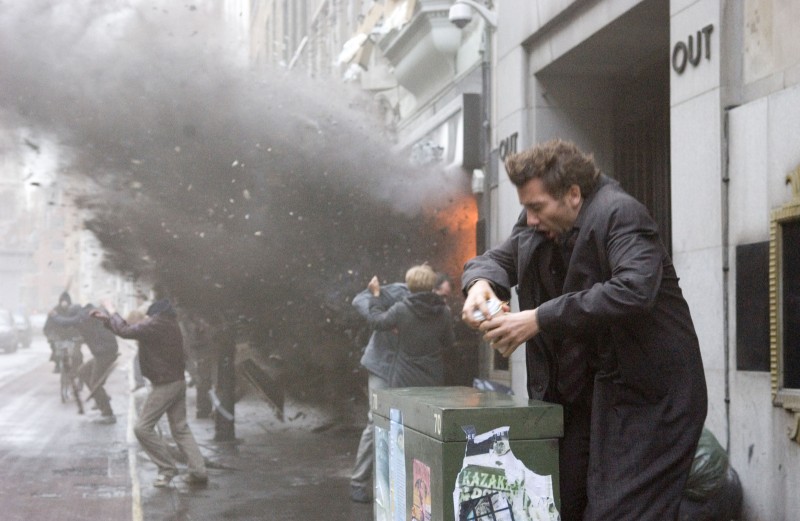
Children of Men, Alfonso Cuaron’s gritty dystopian parable of the near-future (which I saw in Nelson, NZ several days ago), is very, very close to being a great film. Boasting a standout performance by Clive Owen (other than Inside Man he hasn’t been in much lately, so I’d forgotten how good he can be), great character work by Michael Caine, Chiwetel Ejiofor, and others; timely ruminations on issues ranging from the War on Terror to immigration reform; a wicked streak of black humor (note, for example, the bus and pharmaceutical ads, as well as the “Baby Diego” stuff and the casual nod to the similarly sardonic Pink Floyd); cinematography by Emmanuel Lubezki (late of last year’s best film, The New World) that’s both striking and muted; and some of the most visceral urban-warfare scenes this side of Saving Private Ryan, the film has a lot in its corner, and is definitely worth checking out this holiday season. (Between this, The Fountain, and hopefully Pan’s Labyrinth, it’s been a banner time for heady, intelligent sci-fi/fantasy.) Alas, the film takes a few egregious missteps in the last act — the last fifteen minutes, even — which marred the experience for me. As a result, instead of leaving the theater stunned or moved by the otherwise impressive Children of Men, I left irritated with it. It’s a very good, even a remarkable, movie, to be sure, but when it comes to the last few leaps of logic (and sentiment), Cuaron’s film can’t quite stick the landing.
Children of Men takes place in the London of the not-too-distant future, where, as part of a string of world calamities and catastrophes (including some that possibly, Cuaron coyly suggests, have their roots in the Iraq war), humankind has become infertile, western civilization is in the throes of decay, and England, true to stiff-upper-lip form, remains the one teetering bastion of order against the forces of anarchy and global chaos. In this childless city under siege, where immigrants (or “Fugi’s”) are rounded up in cages and coffee shops are bombed for no reason in particular, we meet a troubled Everyman named Theo (Owen — we know he’s troubled because he downs lugs of scotch from a hip-flask whenever possible, but don’t worry — this sort of clumsy screenwriting shorthand is generally the exception here rather than the rule.) At any rate, on his way to work one day, Theo is apprehended by several masked goons in a van, among them his activist ex-girlfriend Julian (Julianne Moore) and her #2 (Ejiofor), who, as it turns out, have a very important task for him — one that only he can fulfill, and one that might just change the shape of this post-apocalyptic world…
If you’ve seen the trailer, then you know what Theo’s charge is for the remainder of the movie. (But if you haven’t, I won’t spoil it here.) Suffice to say, his travels take him to various dilapidated locales in this babyless Purgatory (including, memorably, the hideaway of Theo’s aging drug buddy Jasper (Michael Caine)), and we get a full sense of how the demise of the future, in the form of the next generation, has caused the world to wither and rot. This culminates in some of the most powerful and immersive urban war footage to come down the pike in a good while (note the long, uninterrupted shots in the final act, which are particularly impressive.) But, as you’ll come to find, one of the escape scenarios near the end — you’ll know which one I mean — is completely and utterly implausible, to the detriment of everything that’s come before. And, coupled with the ridiculously over-the-top symbolism in the final moments, Cuaron’s film unfortunately ends on a sour note. Still, if you can forgive the movie its wince of an ending, it’s well worth it to suffer the Children. It may step away from greatness in the last act, but it’s still very easily in the top echelon of movies I’ve seen this year.
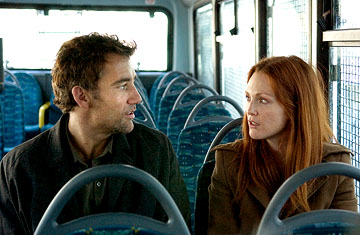
Absolutely Sweet Marie.
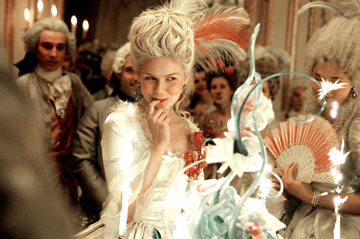 In my generally positive review of Lost in Translation a few years back, I complained that “this story could only have been written by deeply privileged people.” Well, Sofia Coppola’s newest film, Marie Antoinette, makes Lost in Translation seem like a working-class anthem. To be honest, I find my thoughts dwelling on Marie Antoinette in the few days since I saw it, and I’m liking it better in retrospect than I did while actually watching the movie. Still, Coppola’s film seems narrowly conceived to a fault. It conveys both the life-on-Mars quality of Versailles and the innocent decadence of privileged youth decently well (even if Antoinette was almost 35 by the time of the Revolution), but, in my humble opinion, the movie needed a lot more politics and a lot less in the way of shoes and pastries. As it is, despite all the wallowing in material delights, Marie Antoinette displays little in the way of a narrative arc, and, to my mind, it felt both unfinished and unsatisfying.
In my generally positive review of Lost in Translation a few years back, I complained that “this story could only have been written by deeply privileged people.” Well, Sofia Coppola’s newest film, Marie Antoinette, makes Lost in Translation seem like a working-class anthem. To be honest, I find my thoughts dwelling on Marie Antoinette in the few days since I saw it, and I’m liking it better in retrospect than I did while actually watching the movie. Still, Coppola’s film seems narrowly conceived to a fault. It conveys both the life-on-Mars quality of Versailles and the innocent decadence of privileged youth decently well (even if Antoinette was almost 35 by the time of the Revolution), but, in my humble opinion, the movie needed a lot more politics and a lot less in the way of shoes and pastries. As it is, despite all the wallowing in material delights, Marie Antoinette displays little in the way of a narrative arc, and, to my mind, it felt both unfinished and unsatisfying.
As the film begins, mirthful 14-year-old free spirit Marie Antoinette (Kirsten Dunst) has just been married off by her mother, the Empress Maria Theresa of Austria (Marianne Faithful), to the pudgy, young, and introverted dauphin of France, Louis XIV (Jason Schwartzman). And so we spend the first forty minutes of the film following young Marie’s introduction to the cauldron of social intrigue that is Versailles, where she is shuffled to and fro by her grim handler, the Comtesse de Noailles (Judy Davis, looking like the Borg Queen), and becomes the target of a whispering campaign due to her still-unconsummated marriage (a plot point that doesn’t work at all, given how far Dunst and Schwartzman are from 14 and 15 respectively.) At any rate, eventually Marie makes a few friends — most notably the Duchesse de Polignac (Rose Byrne) — and a few enemies, such as Madame Du Barry (Asia Argento), courtesan to Louis XV (Rip Torn). And she picks up several bad habits, including but not limited to gambling, shopping, all-night festivities, and the Count Axel von Fersen (Jamie Dornan), most of which are scored — usually pretty effectively — to post-punk or new wave tracks by Gang of Four (“Natural’s Not in It”), New Order (“Ceremony”), The Cure (“Plainsong”), and others.
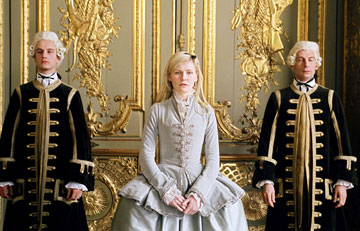 Of course, as we all know, the party can’t last forever, and Marie Antoinette’s reveries have a particularly nasty end. But the Revolution only takes up about fifteen minutes of the film here, and in fact is basically sidestepped (which feels a bit like making a movie about the Titanic and skipping the iceberg, but ah well.) Obviously, it was Coppola’s artistic decision not to wallow in the horrors that beset Antoinette’s final years, but that same lack of focus about anything other than good times at Versailles mars the rest of the film. Contrary to the figure portrayed here, Antoinette was engaged in the political issues facing her kingdom, particularly late in her reign. But, here’s she seems just a poor-little-rich-party-girl until the merde hits the fan in a big way in 1789. (There are a few scenes involving the French decision to aid the American Revolutionaries, I guess, but they seem unconnected to everything else going on and are in effect shoehorned in.)
Of course, as we all know, the party can’t last forever, and Marie Antoinette’s reveries have a particularly nasty end. But the Revolution only takes up about fifteen minutes of the film here, and in fact is basically sidestepped (which feels a bit like making a movie about the Titanic and skipping the iceberg, but ah well.) Obviously, it was Coppola’s artistic decision not to wallow in the horrors that beset Antoinette’s final years, but that same lack of focus about anything other than good times at Versailles mars the rest of the film. Contrary to the figure portrayed here, Antoinette was engaged in the political issues facing her kingdom, particularly late in her reign. But, here’s she seems just a poor-little-rich-party-girl until the merde hits the fan in a big way in 1789. (There are a few scenes involving the French decision to aid the American Revolutionaries, I guess, but they seem unconnected to everything else going on and are in effect shoehorned in.)
Which isn’t to say Marie Antoinette isn’t completely without merit. At times, it — much like The Virgin Suicides, Coppola’s first film — fashions out of the Antoinette story a haunting mediation on the doomed and fleeting transience of youth. (The New Order helps.) And there are several good performances in and around the margins, including Steve Coogan (always threatening to Tristam Shandy at any moment) as the Comte de Mercy-Argenteau and Danny Huston as Emperor Joseph II of Austria (although I do wish he’d thrown in a “hm-hm” to pay homage to Jeffrey Jones.) But, ultimately, this film is just too thin a take on Antoinette’s story to sustain interest over two hours. There’s barely any there there. Even subplots that should be in Coppola’s wheelhouse, given her choice of themes here, seem underdeveloped (most notably Antoinette’s rivalry with Du Barry — It happens, but doesn’t really amount to anything.) And, while the last few shots are undeniably haunting, they can’t justify the long and circuitous route it took to get there. I don’t have a problem with a sympathetic take on Marie Antoinette, per se, but it would’ve been nice to have seen a more fully-developed one.
No Mercy Shown.
This is why events unnerve me…By way of Ed Rants, the new trailer for Sofia Coppola’s Marie Antoinette is out, and it maintains the New Order conceit of the teaser. (Although this time the background ditty is “Ceremony,” not Age of Consent.”)
2005 in Film.
Happy New Year’s Eve to everyone..I’m celebrating in San Diego with old college friends and likely won’t update again until 2006. So, without further ado, here’s the 2005 movie round-up. Overall, it’s been a pretty solid year for cinema, and this is the first year in the past five where the #1 movie wasn’t immediately obvious to me. But, still, choices had to be made, and so…
[2000/2001/2002/2003/2004]
[Note: The #1 movie of 2005 changed in early 2006: See the Best of 2006 list for the update…]
1. Syriana: I know Stephen Gaghan’s grim meditation on the global reach and ruthlessness of the Oil Trade rubbed some people the wrong way, but I found it a gripping piece of 21st century muckraking, in the venerable tradition of Ida Tarbell and Upton Sinclair. True, Christopher Plummer was a mite too sinister, but otherwise Syriana offered some of the most intriguing character arcs of the year, from morose CIA Field Agent George Clooney’s ambivalent awakening to corporate lawyer Jeffrey Wright’s courtship with compromise. In a year of well-made political films, among them Good Night, and Good Luck, Munich, Lord of War, and The Constant Gardener, Syriana was the pick of the litter.
2. Layer Cake: If X3 turns into the fiasco the fanboy nation is expecting with Brett Ratner at the helm, this expertly-crafted crime noir by Matthew Vaughn will cut that much deeper. Layer Cake not only outdid Guy Ritchie’s brit-gangster oeuvre in wit and elegance and offered great supporting turns by Michael Gambon, Kenneth Cranham, and Colm Meaney, it proved that Daniel Craig had the requisite charisma for Bond and then some (and that Sienna Miller is no slouch in the charisma department either.)
3. Ballets Russes: Penguins and comedians, to the wings — The lively survivors of the Ballets Russes are now on center stage. Like the best in dance itself, this captivating, transporting documentary was at once of the moment and timeless.
4. Good Night, and Good Luck: Conversely, anchored by David Strathairn’s wry channeling of Edward R. Murrow, George Clooney’s second film (and second appearance on the 2005 list) couldn’t have been more timely. A historical film that in other hands might have come off as dry, preachy edutainment, Good Night, and Good Luck instead seemed as fresh and relevant as the evening news…well, that is, if the news still functioned properly.
5. Batman Begins: The Dark Knight has returned. Yes, the samurai-filled first act ran a bit long and the third-act train derailing needed more oomph. Still, WB and DC’s reboot of the latter’s second biggest franchise was the Caped Crusader movie we’ve all been waiting for. With help from an A-list supporting cast and a Gotham City thankfully devoid of Schumacherian statuary, Chris Nolan and Christian Bale brought both Batman and Bruce Wayne to life as never before, and a Killing Joke-ish Batman 2 is now on the top of my want-to-see list.
6. Harry Potter and the Goblet of Fire: As I said in my original review, I initally thought Cuaron’s Azkhaban couldn’t be topped. But give Mike Newell credit: Harry’s foray into Voldemortish gloom and teenage angst was easily the most compelling Potter film so far. Extra points to Gryffindor for Brendan Gleeson’s more-than-slightly-bent Mad-Eye Moody, and to Slytherin for Ralph Fiennes’ serpentine cameo as He-Who-Must-Not-Be-Named.
7. King Kong: I had this film as high as #2 for awhile, and there are visual marvels therein that no other movie this year came close to offering, most notably Kong loose in Depression-Era New York City. But, there’s no way around it — even given all the B-movie thrills and great-ape-empathizing that PJ offers in the last 120 minutes, the first hour is close to terrible, which has to knock the gorilla down a few notches.
8. Capote: When it comes to amorality for artistry’s sake, Jack Black’s Carl Denham ain’t got nothing on Philip Seymour Hoffman’s Truman Capote. I think it’d be awhile before I want to watch this movie again, but, still, it was a dark, memorable trip into bleeding Kansas and the writerly id.
9. Sin City: One of the most faithful comic-to-film adaptations on celluloid also made for one of the more engaging and visually arresting cinematic trips this year. I don’t know if the look and feel of Sin City can sustain a bona fide franchise, but this first outing was a surprisingly worthwhile film experience (with particular kudos for Mickey Rourke’s Marv.)
10. Munich: I wrote about this one at length very recently, so I’ll defer to the original review.
11. Brokeback Mountain: A beautifully shot and beautifully told love story, although admittedly Ang Lee’s staid Brokeback at times feels like transparent Oscar bait.
12. Lord of War: Anchored by Nicholas Cage’s wry voiceover, Andrew Niccol’s sardonic expose of the arms trade was the funniest of this year’s global message films (That is, if you like ’em served up cold.)
13. The Squid and the Whale: Speaking of which, The Squid and the Whale made ugly, embittered divorce about as funny as ever it’s likely to get, thanks to Jeff Daniels’ turn as the pretentious, haunted Bernard Berkman.
14. Star Wars Episode III: Revenge of the Sith: Thank the Force for small kindnesses: George Lucas put the Star Wars universe to bed with far and away his best outing of the prequels. The film flirts dangerously with the Dark Side, particularly in the “let’s take a meeting” second act, but for the most part Sith felt — finally — like a return to that galaxy long ago and far, far away.
15. A History of Violence: I think David Cronenberg’s most recent take on vigilantism and misplaced identity was slightly overrated by most critics — When you get down to it, the film was pretty straightforward in its doling out of violent fates to those who most deserved them. Still, solid performances and Cronenberg’s mordant humor still made for a far-better-than-average night at the movies.
16. Walk the Line: Despite the great performances by Joaquin Phoenix and Reese Witherspoon, Walk the Line ultimately seemed too much of a by-the-numbers biopic to do the Man in Black full credit. But, definitely worth seeing.
17. In Good Company (2004): Paul Weitz’s sweet folktale of synergy, downsizing, and corporate obsolescence was too charitable and good-natured to think ill of any of its characters, and I usually prefer more mordant fare. Nevertheless, the intelligently-written IGC turned out to be a quality piece of breezy pop filmmaking.
18. The Constant Gardener: Another very good film that I still thought was slightly overrated by the critics, Fernando Meirelles’ sophomore outing skillfully masked its somewhat iffy script with lush cinematography and choice Soderberghian editing.
19. Primer (2004): A completely inscrutable sci-fi tone poem on the perils of time travel. Kevin and I saw it twice and still have very little clue as to what’s going most of the time — but I (we?) mean that in the best way possible.
20. The Chronicles of Narnia: The Lion, the Witch, and the Wardrobe: The Chronic-what? Andrew Adamson’s retelling of C.S. Lewis’s most popular tome lagged in places, and the two older kids were outfitted with unwieldy character arcs that often stopped the film dead, but it still felt surprisingly faithful to the spirit of Narnia, Christianized lion and all.
Most Disappointing: The Fantastic Four, which I finally saw on the plane yesterday — One of Marvel’s A-List properties is given the straight-to-video treatment. From the Mr. Fantastic bathroom humor to the complete evisceration of Dr. Doom, this movie turned out just as uninspired and embarrassing as the trailers suggested. Runner-Up: The Brothers Grimm. Terry Gilliam’s long-awaited return wasn’t exactly a return-to-form. But, hey, at least he got a movie made, and Tideland is just around the corner.
Most Variable: Hitchhiker’s Guide to the Galaxy: I still haven’t figured out how I feel about this one. I liked it quite a bit upon first viewing, but it didn’t hold up at all the second time around. Still, the casting feels right, and I’d be up for The Restaurant at the End of the Universe, provided they turn up the Ford-and-Zaphod shenanigans and turn down the forced Arthur-and-Trillian romance.
Worth a Rental: Constantine, Aliens of the Deep, Me and You and Everyone We Know, Charlie and the Chocolate Factory, The Island, March of the Penguins, The Aristocrats,Tim Burton’s Corpse Bride, Jarhead, Sarah Silverman: Jesus is Magic, The Ice Harvest, War of the Worlds
Ho-Hum: Inside Deep Throat, The Jacket, Million Dollar Baby (2004), The Ring 2, Kingdom of Heaven, Unleashed, Mr. & Mrs. Smith,
Aeon Flux
Best Actor: Philip Seymour Hoffman, Capote; Eric Bana, Munich; Heath Ledger, Brokeback Mountain; David Straitharn, Good Night, and Good Luck
Best Actress: Reese Witherspoon, Walk the Line; Naomi Watts, King Kong
Best Supporting Actor: Jeff Daniels, The Squid and the Whale; George Clooney, Syriana; Brendan Gleeson, Harry Potter and the Goblet of Fire
Best Supporting Actress: Maria Bello, A History of Violence; Tilda Swinton, The Chronicles of Narnia
Unseen: The 40-Year-Old Virgin, Bee Season, Broken Flowers, Cache, Casanova, Cinderella Man, Crash, Enron: The Smartest Guys in the Room, Grizzly Man, Gunner Palace, Head On, Hustle & Flow, Junebug, Match Point, The New World, Nine Lives, Pride and Prejudice, Serenity (although I watched all of Firefly last week), Shopgirl, The Three Burials of Melquiades Estrada, Wallace and Gromit: The Curse of the Were-Rabbit, Wedding Crashers
2006: Frankly, the line-up doesn’t look too exciting at the moment. Nevertheless, 2006 will bring A Scanner Darkly, Casino Royale, The Da Vinci Code, Flags of our Fathers, The Good German, The Inside Man, Marie Antoinette, M:I III, Pirates of the Caribbean 2, Snakes on a Plane (!!), Southland Tales, Superman Returns, Tristam Shandy, V for Vendetta, and X3.
Power, Corruption, and Lies.
From the Age of Consent to the Age of Revolution comes this spiffy new trailer for Sofia Coppola’s biopic of that monument of ’80’s excess, Marie Antoinette, starring Kirsten Dunst, Jason Schwartzman, and Asia Argento. Somehow, I don’t think the real Marie Antoinette had much love for (the) New Order.
Man of Constant Sorrow.
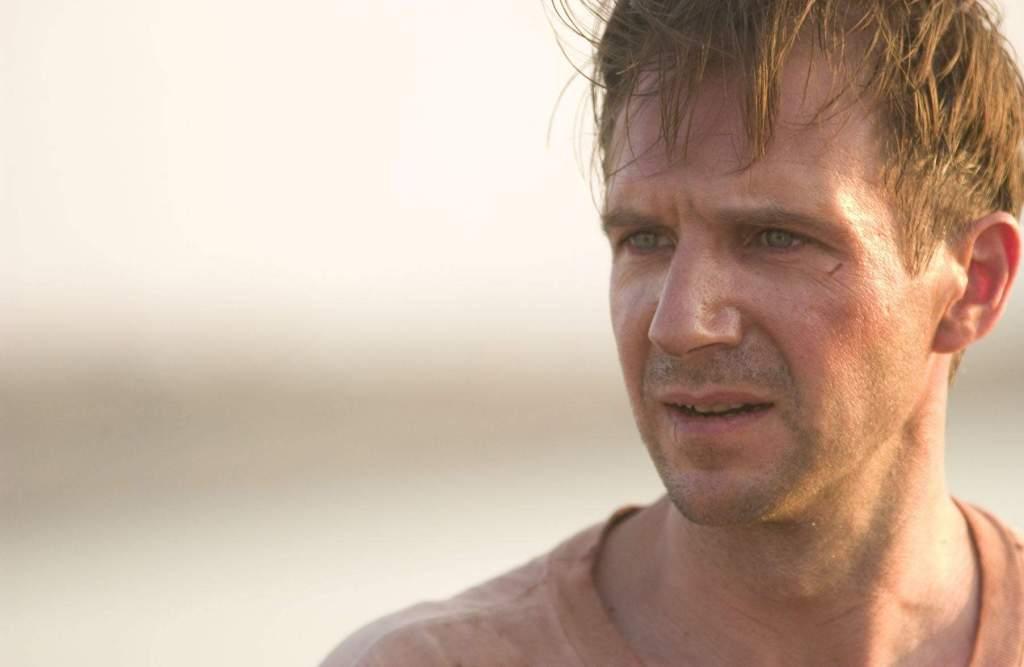
Next up on the Labor Day bill was Fernando Meirelles’ well-received The Constant Gardener, starring Ralph Fiennes and Rachel Weisz in a sort-of action-romance-thriller-edutainment about the extreme shadiness of the Pharmaceutical Trust’s clinical trials in Africa. (Or, put another way, it’s The Limey meets Hotel Rwanda meets The Bourne Supremacy meets The Girl in the Cafe.) At its best, The Constant Gardener is a compelling travelogue and a resonant Soderberghian love story, anchored by a great performance by Fiennes and solid supporting work by Weisz, Bill Nighy, and others. (By the way, nothing screams “English conspiracy” quite like the presence of Gerard McSorley, who plays a pharmaceutical tough here. Between him and Pete Postlethwaite flitting in and out, this occasionally seemed like In the Name of the Father transported to Kenya.) But, Gardener also suffers some of the defects of Meirelles’ earlier film, City of God, namely an overreliance on shaky hand-held camera work and a plot that strains credulity often enough to detract from the overall experience.
So the upshot is this: Fiennes, the titular gardener, is a kindly and reclusive British diplomat in Kenya with an ill-defined job and a young new activist wife (Weisz), whom he met-cute (well, sorta) at a lecture he gave back in England and married after a whirlwind romance. When Weisz is found murdered on a desolate, unforgiving stretch of African road beside her colleague and possible lover (Hubert Kounde), Fiennes is forced to abandon the orderly and carefully tended confines of his mental garden and embark on a quest to discover both why she was killed and how she lived. Along the way, he finds that large pharmaceutical companies, the nemeses of his slain wife, have been rigging clinical trials and, worse, hiding the fatal side effects of their drugs by erasing the existence of poverty-stricken Kenyans who were administered them (How these fatal side effects were supposed to go over once these drugs went on the market is left unexplained.) Whatsmore, he soon finds his superiors at the embassy (Danny Huston, Nighy) have been steadfastly looking the other way, and that the global reach of Big Pharma isn’t above using strongarm tactics to ensure the truth never gets out…
The Constant Gardener is expertly acted and expertly put together, and it’s deserves the high praise it’s been getting — it’s easily one of the better films of this year so far. Nevertheless, I had nagging problems with the movie. For one, while I have no doubt that Big Pharma is up to many grievous misdoings in Africa (and elsewhere) in the name of the almighty buck, and I wouldn’t be surprised in the slightest if they have unctuous corporate flaks cooking books and crossing the palms of anybody it might help them to buy off, I had trouble believing that they were this kind of shady, with a seemingly universal intelligence capability and more agents than SMERSH. (Also, while I’m sure this type of trial-tinkering probably happens, the real pharmaceutical conspiracy — as others have noted — is how companies simply ignore medical crises in the developing world and attempt to ban the use of generic drugs in devastated areas.)
Also, while I could see how Fiennes’ character might be this clueless about his wife’s life-work if he had seemed more distracted during her lifetime, as played he’d have to be willfully oblivious to miss what’s going on. (Perhaps his almost-disturbing passivity is the point — the script seems to say as much at times — but I still felt it rang false.) Add an overdose of shakicam work (don’t sit too close) and some rather pointless action sequences (the late second act car chase, the bandit attack) and The Constant Gardener falls out of the top echelon of all-time-great films. But, in an otherwise down year for movies, Gardener is an adult, intelligent thriller and a believable romance that’s well above the mean and well worth catching.

